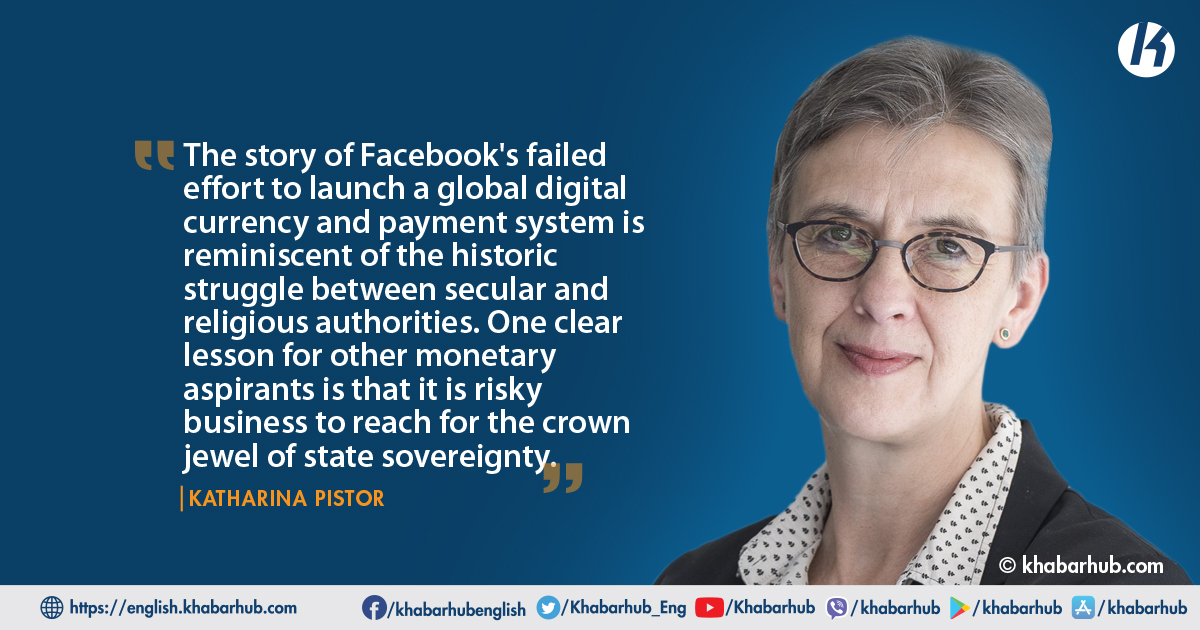In June 2019, Facebook made a daring announcement: within a year, it would launch a new global currency, the Libra.
The idea was to offer an alternative to national currencies in cross-border transactions, and to provide a payment network for billions of unbanked people.
A strictly digital token, the Libra was to be issued by an association in Switzerland and backed by a basket of national currencies, implying that its creators sought independence from sovereign powers.
But Facebook soon lowered its sights. Libra has since been renamed Diem, and the issuing entity has moved from Switzerland to the United States, where it has formed a partnership with Silvergate Bank to issue a token that complies with US banking regulations.
A project that began by taking its name from a Roman currency and wrapping itself in the image of Caesar Augustus has ended as part of an online financial-services platform based in a corporate office park in La Jolla.
The Financial Stability Board, which counts the G20 among its members, launched a review of the existing regulatory frameworks and began coordinating the response to Libra and other aspiring global stable coins.
Libra’s quick rise and fall is a telltale case of a premature and ill-designed attempt to challenge the powers that be.
Among other things, its fate highlights the critical importance of building coalitions that are willing and able to play both offense and defense against challengers.
Facebook and the Libra Association did not invent the idea of digital currencies, which had been around for a decade.
Nor were they breaking new ground in payment systems. Companies like PayPal have been building alternative systems in the shadow of (and often by piggybacking on) existing banking infrastructure for more than two decades.
This low profile was both a strength and a weakness: it allowed new platforms to expand without raising the ire of regulators; but it also left them dependent on legacy institutions and easy to copy.
As a latecomer to the game, Facebook hoped to use its comparative advantage as a digital platform with more than 2.3 billion users to take digital currency mainstream.
Building on the “stable coin” fad, Libra was to be tethered to a basket of currencies issued by countries with a reputation for stability, and with reliable backstopping from central banks.
Its value would track a weighted average of the British pound, the US dollar, the euro, the Singapore dollar, and the Japanese yen, even though it would be issued by an entity outside any of those countries’ jurisdictions.
Facebook’s retreat has been less dramatic: a reshuffling of paperwork and negotiations with a different set of regulators are all it took to decamp to Southern California.
The regulatory backlash was swift and fierce. Within weeks, hearings were organized in both houses of the US Congress, and politicians around the world voiced their disapproval.
National authorities quickly formed a united front and pledged to scrutinize every aspect of what they perceived as a threat to their monetary sovereignty.
The Financial Stability Board, which counts the G20 among its members, launched a review of the existing regulatory frameworks and began coordinating the response to Libra and other aspiring global stable coins.
Nothing unites disparate interests like a common enemy. Libra’s ambition was more than the world’s leading economic powers could take.
No matter how much Facebook CEO Mark Zuckerberg pleaded for leniency or fearmongered about China’s efforts to develop a global digital payment system, he could not sway the powers that be.
Facebook was forced to retreat. First, the Libra Association started losing key members. When Visa, Mastercard, and PayPal left, the writing was on the wall, even though the overall number of members continued to increase.
To alleviate market and political concerns, Facebook had to renounce its own engagement with the association. Then came the ill-fated renaming from Libra (balance) to Diem (day), which has been tainted by copyright issues.
When the Diem Association finally announced its relocation from Switzerland to the US this month, it was hard not to be reminded of Henry IV’s infamous trek to Canossa in 1077.
Though Henry was emperor of the Holy Roman Empire, he was forced to humiliate himself by crossing the Alps in winter to beg for leniency from Pope Gregory VII, whose authority he had openly challenged by appointing bishops in contravention of a papal decree.
Monetary incumbents also can learn from Libra’s fate. In earthly matters, power is always contested and therefore always temporary. With challengers perpetually waiting in the wings, incumbents that do not learn how to control them will eventually have to yield.
Henry’s challenge to papal authority succeeded as long as he had the German kings behind him. But the pope responded by excommunicating Henry, denouncing the other kings’ pledge of allegiance, and lobbying them to deny Henry their support unless he agreed to atone. When Henry’s allies wavered, he had no choice but to submit himself on both knees to the pope.
Facebook’s retreat has been less dramatic: a reshuffling of paperwork and negotiations with a different set of regulators are all it took to decamp to Southern California.
Nonetheless, the history of the struggle between secular and religious power, epitomized by Henry and Gregory’s standoff, holds lessons for power seekers today.
Above all, it is risky business to reach for the crown jewel of state sovereignty – in this case, money. If you dare to do so, you should be sure that you and your collaborators are sufficiently independent from the power that is being challenged.
And you had better have the capacity to backstop your own money, lest it crash when its holders seek safety and rush for the exit.
Monetary incumbents also can learn from Libra’s fate. In earthly matters, power is always contested and therefore always temporary. With challengers perpetually waiting in the wings, incumbents that do not learn how to control them will eventually have to yield.
(Katharina Pistor is Professor of Comparative Law at Columbia Law School)
Copyright: Project Syndicate









Comment